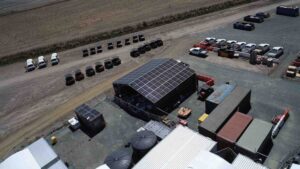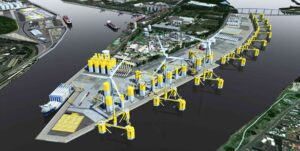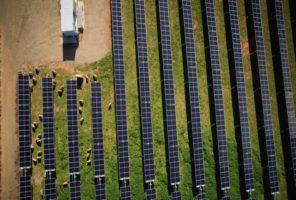Swedish energy group Vattenfall has won the tender for the second phase of the Hollandse Kust Zuid (HKZ) 3 & 4 offshore wind farm in Dutch waters and will join HKZ 1 & 2 as the first two non-subsidised offshore wind farms in the world when they are commissioned.
This is the second tender requesting bids for subsidy-free contracts, and it is unsurprising that Vattenfall won this contract as well as the first, as the company promised to utilise economies of scale resulting from the four neighbouring wind farms to reduce the costs of the project.
Vattenfall won the right to build Hollandse Kust Zuid (roughly translated Dutch Coast South) 1 & 2 in September 2018 and both wind farms must be completed in 2023.
The 700MW HKZ 1 & 2 and the 760MW HKZ 3 & 4 will utilise 10MW wind turbines provided by Siemens Gamesa Renewable Energy.
Offshore construction is expected to begin in 2022 and, instead of receiving government subsidies in support of construction, Vattenfall will actually be paying €2 million per year in ground rent for the seabed area where the Hollandse Kust Zuid 3 & 4 wind farm will be constructed.
“This is excellent news for Vattenfall, our partners and the Dutch energy transition,”crowed Magnus Hall, CEO of Vattenfall.
“It means a significant step for Vattenfall in view of our ambition to make fossil-free living possible within one generation and to grow in renewable energy production. The Netherlands is an important market for us and this will be one of our biggest offshore projects. We are looking forward to contribute with this project to the transformation of the Dutch energy system.”
“Winning the bid for Hollandse Kust Zuid 3 & 4 is a result of our continuous efforts along our entire value chain and the solid track record and portfolio approach of our company,” added Gunnar Groebler, Senior Vice President and Head of Business Area Wind of Vattenfall.
“Adding to that, working collaboratively with our partners in the supply chain has enabled us to hand in a state-of-the-art proposal for this project. We can bundle now the projects Hollandse Kust Zuid 1&2 and 3&4 which is a great advantage leading to further optimization and synergies.”
The Dutch Ministry of Economic Affairs and Climate Policy announced the winning recipient on Wednesday and highlighted the rapid decline in the need for government subsidies for offshore wind farms. “As recently as 2016, the developer of the Borssele Wind Farm Zone was still receiving subsidies for the electricity it generated,” the Ministry explained in their press release.
Unsurprisingly, the news of another unsubsidised European offshore wind farm was praised by those within and around the industry.
“This auction shows yet again that offshore wind is now very competitive – and is consistent with Bloomberg data that shows offshore wind is now the cheapest form of new power in North Western Europe apart from onshore wind,” explained Giles Dickson, CEO of WindEurope, the region’s wind energy trade body.
“The ‘zero bid’ system seems to work in the Netherlands, because the Dutch share a lot of the project risk, and it’s not hard for wind farms to find corporate buyers for the power they produce. But in most European countries offshore wind auctions need to offer stable revenues – and this reduces the financing and therefore the total societal costs.
“The Dutch are doing well on offshore wind. They’ve a good steady auction plan of 700MW every year. They provide clear visibility of what they’re auctioning and when which helps reduce costs. They’re taking a strategic approach to grid investments – and a healthy long-term view of marine spatial planning aiming at happy co-existence between offshore wind and e.g. fishing and biodiversity.
Their recent Climate Agreement sets a target of 11.5 GW total offshore wind by 2030: they could actually do more than this and should do once they factor in increased electrification in industry.”
The news of a zero-subsidy offshore wind farm in the Netherlands came only days after Bloombergreportedthat at least one fund manager is expecting zero-subsidy offshore wind farms to be a reality for the next UK Contract for Difference (CfD) auction round, which is currently accepting bids and which is expected to be awarded later this year.
Deirdre Cooper, who helps oversee clean investments at Investec’s asset management division, expects the auction strike level to be “highly competitive with the wholesale price, as next-generation multi-megawatt turbines are likely to be used which will significantly reduce costs.”











